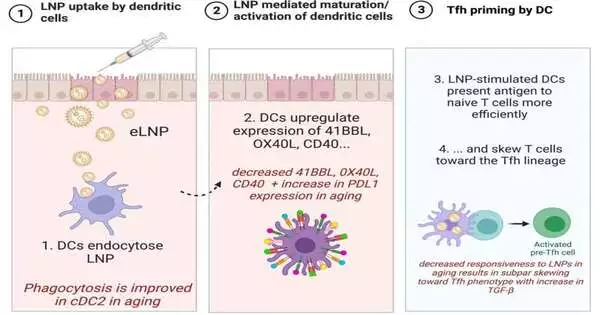Although the Pfizer-BioNTech and Moderna mRNA COVID-19 vaccines are safe and effective at preventing severe illness in adults and children, including immunocompromised individuals, researchers have observed that these shots continue to be more efficient and effective in younger individuals than in older adults.
Lipid nanoparticles, or LNPs, a crucial component of these vaccines that delivers the mRNA cargo to cells, including cells of the innate immune system (or response cells), were the subject of research at the Perelman School of Medicine at the University of Pennsylvania and the College of Medicine at Drexel University.
These researchers demonstrated that LNPs can stimulate innate immune cells in both old and young people, but do so more effectively in the latter. Their findings were recently published in the journal Communications Biology.
“As new infectious diseases emerge and new opportunities for mRNA vaccines emerge, the need for better vaccine platforms is likely to increase in the coming years.”
Lead author Jennifer Connors, Ph.D.,
The COVID-19 vaccines based on mRNA have been approved by the U.S. In 2021, the Food and Drug Administration and the European Medicines Agency will use messenger RNA to tell cells to make proteins. Penn Medicine created the mRNA technology used in those vaccines.
In the case of COVID-19 vaccines, the mRNA instructs the cells to produce the SARS-CoV-2 spike protein, one component of the virus, to assist the immune system in recognizing it and generating antibodies to fight and neutralize the virus upon subsequent infection.
Although they may appear straightforward, these vaccines rely on crucial lipids (fat-like molecules) packaging to protect and deliver the mRNA into cells. Nanoparticles of lipid make up the packaging. These LNPs are typically composed of four different types of lipids, one of which acquires a positive charge when exposed to a small amount of acidity, enabling the packaging of the negatively charged mRNA during the creation of vaccines.
Cholesterol, which is also present in foods and our bodies, and other molecules that support structure and stability are additional components of LNPs. The mRNA is released by LNPs as soon as they enter cells.
Without LNPs, there would be no mRNA vaccine for COVID-19 or other infectious diseases like respiratory syncytial virus (RSV), cytomegalovirus (CMV), and others.
Using cell cultures made from human-derived tissue, the research team examined the impact of LNPs. From the blood of 18 healthy adult donors, ranging in age from 25 to 75, the researchers isolated immune cells known as monocytes.
Elias El Haddad, Ph., the senior author, stated that “the adjuvanted effect of a mRNA-based vaccine is delivered primarily by ionizable lipids in the LNP.”. D., a professor at the college of medicine. “We discovered that empty LNPs, or those lacking mRNA, stimulate dendritic cell maturation, during which cells transition from the processing stage to stimulate innate immune system pathways, which are less effective in older adults over the age of 65 compared to younger adults.”.
Earlier data from co-corresponding author Mohamad-Gabriel Alameh, Ph., are supported by these new findings. Ionizable lipids increase the efficacy of vaccines, according to the director of Penn Medicine’s Engineered mRNA and Targeted Nanomedicine Core. The authors looked at how these LNPs affected innate immune cells in humans and found differences between older and younger adults.
LNPs are a crucial component of mRNA-based vaccines, according to the researchers, and they aid in the onset of the immune response to the vaccine. The lack of vaccine response in these people may be explained by a less effective response to LNPs in older adults, which also highlights the need to enhance these responses in the elderly population.
Lower or less effective immune responses to vaccines in older people are not related to the vaccine platform, according to Alameh. It’s caused by metabolic activity, genetics, and inflammation.”.
The authors emphasize how important it is to comprehend how the immune system reacts to LNPs and other vaccine adjuvants in older people, because doing so may help develop strategies for making vaccines more effective in older people or even help create vaccines that are specifically designed for them.
The most recent study comes after earlier work by El Haddad and colleagues that concentrated on creating substances to enhance elderly adults’ immune responses to vaccines against HIV, another viral infection. Adenosine deaminase-1 is a compound that El Haddad and colleagues identified in a study that was published in 2019 that described its function in T cell function in HIV-positive adults. They have patented this compound.
El Haddad stated, “When a pandemic strikes, you always try to pivot and understand better how to utilize your experience to develop better vaccines for new diseases.”. “We first looked at the delivery system—the LNP, which is also the adjuvant part of the vaccine—when we noticed that the immune response to the vaccine was less effective in older individuals than it was in younger individuals. This led us to understand what influences the LNP’s efficiency.
El Haddad stated that the next stage of the research is to enhance the LNP’s adjuvant effect in order to increase the effectiveness of each dose. The team is currently working on a number of strategies, including supplementing the LNP with their own adjuvant to see if it is as effective in older individuals as it is in younger ones.
Lead author Jennifer Connors, Ph., said, “As new infectious diseases and opportunities for mRNA vaccines emerge in the coming years, the need for better vaccine platforms will likely only grow.”. D., who took part in the study while obtaining his doctorate at the Drexel College of Medicine and is currently employed by a pharmaceutical company. “The COVID vaccines were developed after decades of research into mRNA vaccines, and future decades of research will result in incredible vaccine advancements to fight diseases like cancer.”.
More information: Jennifer Connors et al, Lipid nanoparticles (LNP) induce activation and maturation of antigen presenting cells in young and aged individuals, Communications Biology (2023). DOI: 10.1038/s42003-023-04555-1





